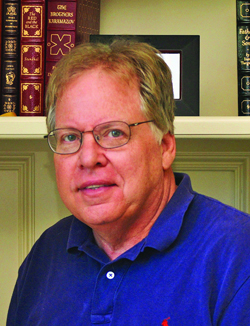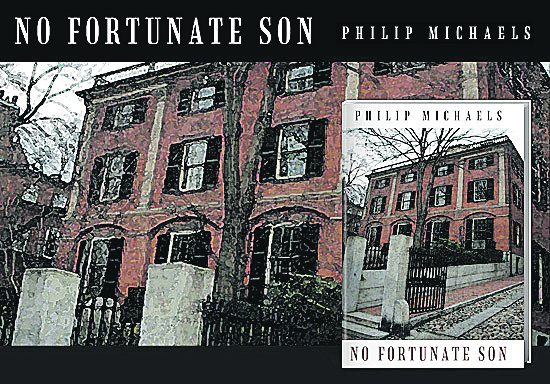 | | | Author Phil Litchenstein
Photos provided
| | | | | |
It is present day when protagonist Patrick Golden reads in a New York Times obituary that his good friend has died. A memorial service across the country, and a woman from his past awaiting him, sets the mysterious backdrop for Lafayette author Phil Litchenstein's historical fiction No Fortunate Son, written under the pen name Philip Michaels.
 On his way to Boston, Golden takes readers on a journey into his past and to the turbulent times as a UC Berkeley college student in the late 1960s. Readers follow Golden, for example, along Telegraph Avenue as he is "squeezed through a disorderly mob of placard-carrying war protestors, hippies, dancing Hare Krishnas, panhandlers, and doorway drug dealers - its habitues. Over the pounding of their jungle drums and the clashing of their finger cymbals, he could hear their chants, mantras and supplications as he hurried past." On his way to Boston, Golden takes readers on a journey into his past and to the turbulent times as a UC Berkeley college student in the late 1960s. Readers follow Golden, for example, along Telegraph Avenue as he is "squeezed through a disorderly mob of placard-carrying war protestors, hippies, dancing Hare Krishnas, panhandlers, and doorway drug dealers - its habitues. Over the pounding of their jungle drums and the clashing of their finger cymbals, he could hear their chants, mantras and supplications as he hurried past."
 Litchenstein captures the essence of the period, incorporating the many events that rocked the nation and shifted the perceptions of its youth.
Litchenstein captures the essence of the period, incorporating the many events that rocked the nation and shifted the perceptions of its youth.
 "I wanted to recreate that unique social and political era right down to the events, sights, sounds, and ideas that led to the counterculture of the youth," Lichtenstein says.
"I wanted to recreate that unique social and political era right down to the events, sights, sounds, and ideas that led to the counterculture of the youth," Lichtenstein says.
 Throughout the book, Litchenstein builds upon the dichotomy between the working middle class and the super-rich Harvard elite, the Republican right and the liberal left. The book's engaging characters are believable in both voice and depth, with most taken from Litchenstein's own life and experiences.
Throughout the book, Litchenstein builds upon the dichotomy between the working middle class and the super-rich Harvard elite, the Republican right and the liberal left. The book's engaging characters are believable in both voice and depth, with most taken from Litchenstein's own life and experiences.
 "I think it was easier having lived the book," says Litchenstein, who earned his bachelor's degree from UC Berkeley in 1970. "For example, some of the characters didn't need to be invented, only described on paper. 'Hank Golden' was my father right down to the huge forearms and extraordinarily heavy use of blue language. 'Charles' was patterned exactly after my socially well-connected roommate who was, as described, brilliant. Every one of the bizarre things that happened to 'Barry Reuben' really happened!"
"I think it was easier having lived the book," says Litchenstein, who earned his bachelor's degree from UC Berkeley in 1970. "For example, some of the characters didn't need to be invented, only described on paper. 'Hank Golden' was my father right down to the huge forearms and extraordinarily heavy use of blue language. 'Charles' was patterned exactly after my socially well-connected roommate who was, as described, brilliant. Every one of the bizarre things that happened to 'Barry Reuben' really happened!"
 Litchenstein describes running from riot police at the 1968 Democratic National Convention in Chicago, and the Selective Service draft lottery with Golden and friends gathered around the television in the living room as the member of the House Armed Services Committee "prepared to reach his hand into a glass cylinder and extract the first light-blue plastic capsule containing a date." The author brings readers back to the moments when the nation first learned about the assassinations of Martin Luther King, Jr. and Bobby Kennedy, and of the Kent State riots. Golden and his girlfriend, Morgan Thackeray, the daughter of an extremely wealthy and politically powerful man from Martha's Vineyard, listen to songs from the Beatles' Abbey Road, and Credence Clearwater's new album Willy and the Poor Boys.
Litchenstein describes running from riot police at the 1968 Democratic National Convention in Chicago, and the Selective Service draft lottery with Golden and friends gathered around the television in the living room as the member of the House Armed Services Committee "prepared to reach his hand into a glass cylinder and extract the first light-blue plastic capsule containing a date." The author brings readers back to the moments when the nation first learned about the assassinations of Martin Luther King, Jr. and Bobby Kennedy, and of the Kent State riots. Golden and his girlfriend, Morgan Thackeray, the daughter of an extremely wealthy and politically powerful man from Martha's Vineyard, listen to songs from the Beatles' Abbey Road, and Credence Clearwater's new album Willy and the Poor Boys.
 While the subtext of the novel revolves around a love affair between main characters Golden and Thackeray, No Fortunate Son brings those of us who "lived it" back to a day of peace signs and protests, and to those of us who have only heard of it, to a better understanding of the time.
While the subtext of the novel revolves around a love affair between main characters Golden and Thackeray, No Fortunate Son brings those of us who "lived it" back to a day of peace signs and protests, and to those of us who have only heard of it, to a better understanding of the time.
 Nostalgia aside, however, No Fortunate Son is well written and is an enjoyable read.
Nostalgia aside, however, No Fortunate Son is well written and is an enjoyable read.
 If you're interested in more work by Philip Michaels, you can read his articles in L.A. Splash Magazine at www.lasplash.com. Litchenstein is currently working on a WWII spy novel with FDR, J. Edgar Hoover, and "Wild Bill" Donovan (Head of the OSS) as significant characters, called The Enigma Code, which he hopes to finish within a year.
If you're interested in more work by Philip Michaels, you can read his articles in L.A. Splash Magazine at www.lasplash.com. Litchenstein is currently working on a WWII spy novel with FDR, J. Edgar Hoover, and "Wild Bill" Donovan (Head of the OSS) as significant characters, called The Enigma Code, which he hopes to finish within a year.
 No Fortunate Son can be found at bookstores or online at Amazon.com.
No Fortunate Son can be found at bookstores or online at Amazon.com.

|

